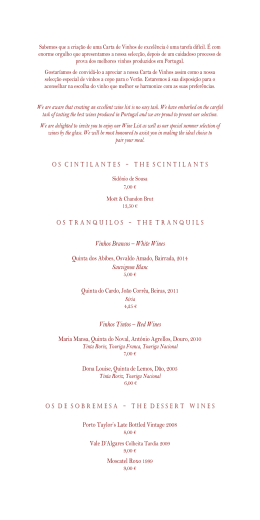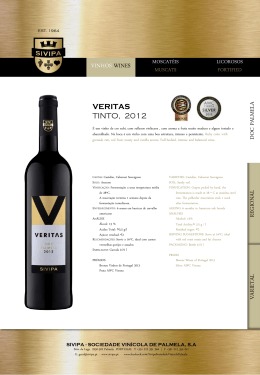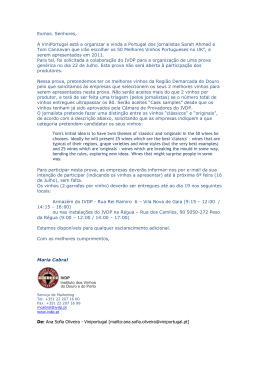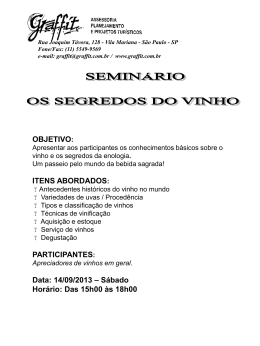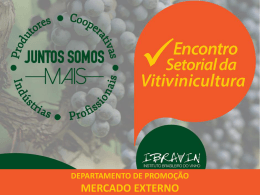MERCADO OPINIÃO MARKET OP INION ARMANDO SEVINATE PINTO DEPOIMENTO DE... CONSELHEIRO DO PRESIDENTE DA REPÚBLICA PARA A AGRICULTURA MÁRCIO FERREIRA GESTOR DE MERCADOS DA VINIPORTUGAL Estamos satisfeitos com a missão cumprida em 2009 no eixo asiático. Ao todo, foram duas semanas de eventos, entre os dias 12 e 21 do passado mês de Maio. Foi importante alargar a nossa linha de acção através da organização de acções paralelas às grandes provas anuais de vinhos e à feira SIAL em Xangai. Conduzimos também diversos seminários, festas de promoção e jantares vínicos que contaram com a presença de muitos líderes de opinião. No total, organizámos nove eventos de promoção para os vinhos portugueses. É de salientar que em todas as provas realizadas no eixo asiático foram registadas as maiores afluências até ao momento em acções ViniPortugal no mercado: uma média de 250 profi ssionais por prova em Hong Kong e Macau. Já a SIAL, atrai cerca de 20 000 visitantes por ano. Estes números são um bom presságio para o futuro dos vinhos portugueses no eixo asiático. A participação na SIAL foi uma aposta ganha. Em Xangai e na China existe de facto potencial para o produto vinho em geral pois começa a haver uma cultura de consumo. Portugal terá de capitalizar nestas oportunidades. Há já algum tempo que planeávamos uma presença numa feira de vinhos na China e a presença da ViniPortugal revelou ser uma boa iniciativa. Como aspecto mais positivo desta missão destacaria a projecção que os vinhos portugueses desfrutaram nestes mercados. Um dos nossos maiores desafios, se não o maior, é passar uma imagem de qualidade dos vinhos de Portugal. Para tal, é importante marcar presença nos vários mercados ano após ano. Assim se vai construindo marca. Penso também que são de louvar os esforços que todos os produtores nacionais têm vindo a fazer nestes últimos tempos. Este sector tem assumido uma posição de responsabilidade face à exportação, o que começa a dar outra força a estas missões e uma nova dimensão aos vinhos portugueses. STATEMENT FROM... MÁRCIO FERREIRA MARKET MANAGER FOR VINIPORTUGAL We are satisfied with our accomplishments in 2009 in the Asian Axis. Overall there were two weeks of events, between the 12th and the 21st of May. It was important to raise our level of intervention, through the organization of events which ran parallel to the big annual tastings and the SIAL fair in Shanghai. We also ran several seminars, promotional parties and wine based dinners, at which we played host to several opinion makers. We organized a total of nine promotional events for Portuguese wines. It should be stressed that all the events organized in Asia were attended by the largest crowds ViniPortugal had ever had at market based events: an average of 250 professionals per tasting in Hong Kong and Macau. SIAL attracts about twenty thousand visitors a year. These numbers are a good omen for the future of Portuguese wines in the Asian Axis. Participation at SIAL went extremely well. There is a growing wine culture in Shanghai, and China generally, which gives wine a great potential. Portugal has to take advantage of these opportunities. For some time now we had been planning to be present at a wine fair in China, and this event proved to be a good initiative. The highlight of this project has been the projection which Portuguese wines enjoyed in these markets. One of our biggest challenges, if not the biggest, is to project an image of quality for Portuguese wines. In order to do so, it is important to be present in the various different markets, year after year. That’s how you establish a brand. I also think it is important to underline the effort that has been put into this by Portuguese producers in recent times. The whole sector has assumed its responsibilities in relation to exports, which is making these projects easier and taking Portuguese wines to a whole new level. AGRICULTURA ADVISER TO THE PRESIDENT O VINHO COOPERATIVO A pesar de sermos um dos mais antigos produtores de vinho da Europa – a Região Demarcada do Douro já fez duzentos e cinquenta anos – e apesar de alguns vinhos excepcionais que sempre produzimos, temos que reconhecer que, até há quatro ou cinco décadas atrás, os bons vinhos portugueses, reconhecidos pelo mercado, se contavam pelos dedos de uma mão. Devemos ao movimento cooperativo e ao surgimento de muitas dezenas de adegas cooperativas, um pouco por todo o país, no fim da década de 50 e durante a década seguinte, uma melhoria muito significativa e quase generalizada da qualidade média dos nossos vinhos. As então modernas adegas cooperativas federaram solidariamente milhares de pequenos, médios e alguns grandes viticultores, remuneraram as suas uvas com maior justiça, introduziram tecnologias inovadoras e constituíram-se como o mais forte e dinâmico segmento cooperativo do sector agrícola. Os Portugueses passaram a dispor de excelentes vinhos, de origem segura, a preços razoáveis, e foram-se progressivamente afastando do “morangueiro”, do “carrascão” e da “água-pé” sem qualidade, que muitos tinham aprendido a gostar por escassez de alternativas. Entretanto passou cerca de meio século, as cooperativas (actualmente, mais de cem e responsáveis por cerca de metade da produção nacional de vinho) continuam a ter as mesmas funções e, em grande parte, as mesmas regras, continuam a escoar as uvas a muitos milhares de pequenos e médios produtores. Muitas delas são bem geridas, fazem e vendem bons vinhos e dispõem de situações financeiras equilibradas. Infelizmente, muitas outras, trabalham em situação muito precária, fazem vinhos que dificilmente conseguem escoar no mercado em razoáveis condições, maioritariamente a granel, pagam pouco e mal aos agricultores, não exportam e têm situações financeiras muito deficitárias. As fórmulas do passado, a gestão não profissionalizada, através de carolas, as dificuldades de agilização dos processos de decisão, a sucessão de responsáveis nas suas direcções, frequentemente pouco preparados, a difícil comercialização isolada dos vinhos, sobretudo quando a sua qualidade deixa muito a desejar, são alguns dos factores que têm dificultado a adequação do funcionamento destas cooperativas a um contexto alterado, crescentemente competitivo e exigente. Acentua-se de dia para dia a necessidade de uma reforma no sistema cooperativo1 que só os dirigentes e os cooperantes estão em condições de operar. Uma reforma inspirada, em primeiro lugar, nos casos de sucesso dentro do próprio sector cooperativo, em Portugal e no estrangeiro e, em segundo lugar, numa análise atenta dos diferentes factores de competitividade que determinam actualmente o difícil e complexo mercado do vinho. A união de esforços e de estruturas entre cooperativas, as economias de escala, a diferenciação dos produtores, a qualificação dos recursos humanos e a redefinição dos poderes de uma gestão profissionalizada poderão ajudar a salvar muitas cooperativas, para bem dos viticultores e da economia nacional. O que não deverá acontecer é que, recusando as reformas, as cooperativas em dificuldade solicitem exclusivamente apoio do Estado para o seu saneamento financeiro, mantendo intocáveis todas as condições que determinaram a sua actual situação. Recordo a propósito que, já há uns anos, se pôs em execução um esquema de saneamento financeiro das cooperativas em geral, com o apoio do Estado, desde que estas pudessem gerar resultados positivos na sua exploração corrente ainda que não estivessem em condições de assumir o serviço das dividas antes contraídas. O sucesso desse saneamento foi muito escasso, quer porque muitas cooperativas tinham resultados de exploração negativos, mesmo sem o serviço da dívida, quer porque os cooperantes não foram solidários, quer porque muito poucas alterações, estruturais e de funcionamento, ocorreram que pudessem favorecer a sua sustentabilidade futura. 1 Vale a pena ler, sobre este tema, um excelente artigo de Rui Falcão, no “FUGAS”, (separata do Público) do dia 18 de Julho. COOPERATIVES Even though we are one of the oldest wine producers in Europe – the Douro Specified Region was founded 250 years ago – and despite some of the exceptional wines we have always produced, we have to admit that up until forty or fifty years ago, there were but a handful of internationally recognized wines on the market. The cooperative wine movement was ultimately responsible for the appearance of dozens of cooperative wineries, all over the country, towards the end of the fifties and during the sixties. This led to significant and overall improvement of the average quality of our wines. Those modern cooperatives gathered thousands of small, medium and even some large scale producers under their wings, paid fairer rates for their grapes, introduced innovative technologies and set themselves up as the strongest and most dynamic segment in the agricultural sector. The Portuguese could now appreciate safe and excellent wines, at reasonable prices, and gradually distanced themselves from the plonk, and other poor quality wines which many had grown to like, given the lack of alternatives. Half a century has passed. Cooperatives (currently there are over a hundred, responsible for half the national produce), continue to have the same goals, in many cases, the same rules and they continue to purchase the crops of several thousand small and medium scale grape growers. A good deal of them are well run, they make and sell good wines and are financially stable. Unfortunately many others are run under precarious conditions and produce wines which they barely manage to sell in bulk. Old methods, amateurish management, complicated decision-making processes, an endless succession of under educated managers and isolated sales strategies for low quality wines which are consequently hard to sell, are just some of the factors which have made the transition of these cooperatives to a different, more competitive and demanding context, increasingly difficult. Day by day the need to reform the cooperative system increases. This is something that only the managers and members can achieve. A reform inspired, first of all, in the success stories from the cooperative sector itself, whether in Portugal or abroad, and secondly in a careful analysis of the different competitive factors which make up the current difficult and complex wine market. The union of efforts and structures among cooperatives, scale economies, product variety, adequate training of human resources and the professionalization of managements could help save many cooperatives, for the good both of the wine producers, and the national economy. What must be avoided is the tendency of cooperatives to avoid reform and then turn to the state for financial help, otherwise maintaining the status quo. I am reminded of the fact that, just a few years ago, a plan was enacted which would help clean up the financial situation of the cooperatives, with state funding, so long as they were capable of achieving positive results in their current operations, even if they were incapable of paying off previously contracted debts. The end results were scarce. Not only because many of these cooperatives had negative results, even without the debt service, but also because many of the members showed a lack of solidarity, and because few structural and functional changes, capable of securing a sustainable future, actually took place. NE WS L E T T E R 5 V INIP OR T UGA L
Download
